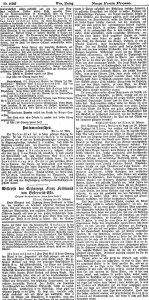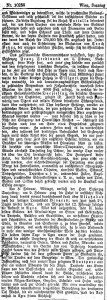In the morning it was said that a strong tiger had killed during the night and had been confirmed almost certainly in a valley not very far away. Against the resident’s advice to send the hunter with the hauda elephants in advance and only follow-up an hour later, we preferred to ride along and were received at the location by the maharaja’s uncle with the message that the tiger was still young and was staying at the spot of the kill. When the wings advanced to form the circle, the tiger transformed itself into a panther, and out of the panther into — nothing. Rather disappointed we left the jungle but as the natives still counted on the presence of a tiger and assured us that one was in the vicinity, a line was formed and a hunt was started in a very open adjacent jungle where no other game than a tiger was to be shot at.
The excellent hunting instinct of the shikaris was splendidly proved as we might just have advanced for about half an hour when th cry of „bara bagh“ rose on the left flank. I was in the center together with Wurmbrand and Kinsky. We had to wait while the wings of the shikaris were ordered to close the circle.
My mahaut pointed constantly to a rather distant grass bush, shouting „bagh“, but I could not see anything as I had a very bad position in the line in a small depression surrounded by trees. In order not to confuse the natives, I kept at my position and saw the tiger move between the trees at a considerable distance while the wings were closing the circle. At that moment, a shot was fired by Kinsky and the struck tiger fell down and lay down near a large tree. Shortly afterward, Wurmbrand on the left of me shot at a weak tiger that I could not see and that, also hit, hid in a grass bush. Immediately afterwards I saw a third tiger, very distant from me, move across a small clearing directly towards Clam who shot it whereas the animal still tried to escape near Kinsky’s but was killed by him,
During the wheeling of the left wing, there was a slight perturbation during which a fourth tiger managed to escape and Fairholme tried to encircle it with some elephants. Stockinger and Prónay wanted to close the gap but lost their direction and suddenly appeared in the heat of the hunt in the middle of the circle and, meeting the tiger wounded by Wurmbrand, opened a sustained rapid fire on it, so that it, pierced by seven bullets, died.
As I saw that the hunt was over, I called Kinsky to come to me and showed him the wounded tiger he had shot in order that he might fire a killing shot. It was his first tiger, a strong female, the mother of the other two one-year-old tigers. The fourth tiger that had escaped must have been the third child of the tigress.
During today’s hunt — another proof of the skill, the quick orientation and the hunting instinct of the Nepalese — we have learned about a new uncommon method of encircling the tiger in a completely open jungle without undergrowth, as the tigers up to now used to be encircled in the thick high grass or reed. Unfortunately, due to my bad position, I had not seen much of today’s hunt but Clam told me that his view across a clearing offered a rare spectacle. When the tigress noted the presence of all the encircling elephants, she sat down, apparently determined to defend herself and her family to the utmost. She placed one of the young on her right, the other on her left, rose on her rear legs and started baring her teeth and roared loudly in all directions.
Unfortunately, during this hunt another elephant was wounded but this time not by a tiger bite but by a stray bullet which might have been deflected from a tree and entered just above the tusk into the elephant’s trunk. Also one of the elephant guides had been wounded by a branch that had been cut by a shot but the wound was minor. A few rupees in compensation served as the best remedy according to the man’s facial expression. Such wounds occur as one has to constantly shoot into the circle and the smooth shala and teak trees easily deflected bullets.
The old uncle of the maharaja was very indignant about the fact that I had not shot a single tiger but I calmed him with the assurance that I was as happy to see the gentlemen of my entourage shooting and had the line form for a general shooting on the way back to the camp. In the surrounding of the camp there was remarkably fewer game than around the first camps as the natives are much quicker to shoot. They still need a special permission to shoot a tiger which is given in case when a tiger inflicts large losses on the cattle herds of the neighboring settlements.
Unfortunately a hornbill was missed again; Fairholme bagged a black buck, the first we had seen in Nepal.
Towards the end of our hunt, close to our camp, two elephants started fighting one another without a known reason. One inflicted with its tusks a heavy tearing and bruising wound on the other elephant’s mahaut’s hollow of the knee and wounded the man so gravely that the poor guy had to spend many weeks in bed to recover.
In the camp we paid a visit to the poor wounded elephant and saw that it was being treated by the doctor. I admired the intelligence and the patience of the animal. On the order of the guard, the elephant lay down on the right side and looked with smart eyes upon the doctor who examined the wound with a probe without finding the bullet. If the elephant was in pain, it only moved its lips but otherwise kept completely calm, also during the more painful washing and swabbing of the wound, as if it was aware that this procedure would be beneficial. The calm of the animal was even more to be admired as the tears that were flowing from the small eyes proved that the pains that the poor „Hathi“ had to bear were considerable.
Links
- Location: Katni, Nepal
- ANNO – on 21.03.1893 in Austria’s newspapers.
- The k.u.k. Hof-Burgtheater is playing „Bernhard Lenz“, while the k.u.k. Hof-Operntheater is performing Rossini’s „Der Barbier von Sevilla“.


